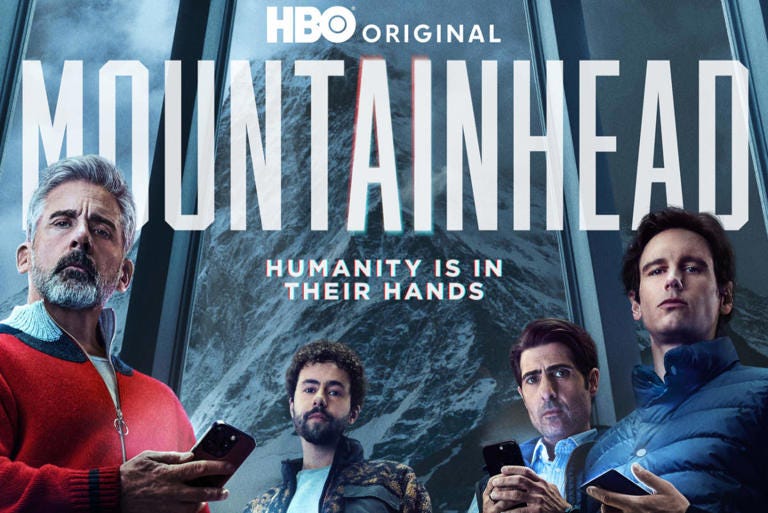Why HBO's tech bro satire 'Mountainhead' is a triggering experience
Much as I love some rich people satires, like Sirens, Your Friends and Neighbors and Mountainhead, I hope Hollywood stops making them...or makes them differently
There is a moment in Jesse Armstrong’s chilling HBO film about a weekend gathering of four wealthy tech bros, Mountainhead, that was particularly triggering for me.
The richest bro, a not-so-thinly-veiled version of Elon Musk played by Cory Michael Smith named Venis, is facing accusations his social media platform has destabilized the world. It allows — according to a rival character played by Ramy Youssef —deepfakes that are impossible to debunk, elevating racist and conflict-filled content which encourages war and violence across the globe.
Venis’ reply sounds like something Musk might have said when he first took over twitter and renamed it X: “First time people saw a movie, everybody ran screaming because they thought they were going to get hit by a train. The answer to that was not [to] stop the movies. The answer was: show more movies. We’re going to show users as much shit as possible until everyone realizes, nothing’s that fucking serious. Nothing means anything. And everything’s funny. And cool.”
This is, of course, the attitude of someone who is insulated from the negative consequences of his technology and enriched by engagement through enragement. (Because what is actually happening, is that average people are losing faith in the institutions which knit society together, even as the tech bro’s platform is actively undermining those institutions.)
He’s speaking to a group of other men similarly isolated by their wealth, power and workaholism -- convinced their success makes them the smartest people on Earth, even as their actions during this terrible weekend prove otherwise.
Armstrong, who wrote and directed Mountainhead, also created HBO’s hit series about a deeply dysfunctional, wealthy family, Succession. And like that TV show, Mountainhead excavates the curious social cues, hierarchies of authority, speech patterns, entitlement and lust for achievement which seem to plague a privileged class – in this case, the current, Silicon Valley-bred rulers of American media and technology. It debuts on HBO Saturday night.
Unlike previous generations of wealthy powerbrokers, these men feel no responsibility to safeguard the welfare of people affected by the forces they control. And despite all their obviously glaring flaws, they keep their powers and privilege, in part, because of a world which systemically forgives, supports and enables them.
This is why I have such a tough time watching movies and films about this. And there have been a lot of them on the small screen lately: Hulu’s Nine Perfect Strangers, Netflix’s Sirens, Apple TV+’s Your Friends and Neighbors, and the grandaddy of them all, HBO’s The White Lotus.
(I talk about this bit during an appearance today on NPR’s midday show, Here and Now. Listen to it by clicking here.)
Each of these series feature obscenely rich characters who are emotionally stunted in some way, often entitled and unable to see how much privilege they have, given to terrible acts in service of their personal goals.
But many of them also end their narratives with a disturbing message: The power of wealth really cannot be defeated, no matter how terrible rich people are, and most people’s only choice is to submit to their madness or get out of their way.
This may be true. It certainly feels like the reality we all are living in right now. But I don’t want to spend hours upon hours watching narratives built around that depressing idea. And I’m not yet willing to believe that is completely true, even now.
I have spent a lot of my professional life pointing out how media – especially TV and film – can inspire change. Barack Obama’s election as the first Black president. Widespread acceptance of gay people and gay marriage. The acknowledgement that human pollution is increasing and intensifying climate change. The widespread recognition that smoking causes cancer.
All examples of how depictions in media helped society foster positive change.
So, I am seriously worried about a flood of streaming/TV series which seem to celebrate wealth as much as satirize it, particularly when the ultimate message feels like a surrender to wealth’s corrosive power.
These days, we need art which points a way past the current madness. Unfortunately, Armstrong’s Mountainhead isn’t that.
But it is a knowing, laser-like exploration of the culture which has led us here, exposing the naked emperors who have pushed the world to pretend their damaging compulsions are the stuff of unalloyed genius and boundless achievement.
With any luck, it just might inspire someone in the real world to figure out how we can all survive it.






I like the way you make your point here. Other than Sirens, I have not had much interest in these types of shows. There are so many great entertainment options that I don’t have to be triggered by real world events being played out by actors.
Damn you have a really good point about all the shows covering wealth. We need some counterpoint either showing people successfully going against the current bros in charge or showing a different type of successful person with morals. Right now it is a lot of shows where the plot is basically "oh well rich people just be crazy and there is nothing we can do to stop them destroying our world".